Consuming a bowl of contemporary strawberries is a fairly easy, wholesome pleasure. Or so it was till a latest surprising report revealed they high the 'soiled dozen' vegetables and fruit bought in our supermarkets.
Analysing the most recent authorities information, Pesticide Motion Community UK discovered that 95% of strawberries, whether or not natural or not, include PFAS pesticides – additionally recognized in hunger-stricken phrases as 'perpetually chemical compounds' as a result of as soon as they've been eaten, there's no eliminating them.
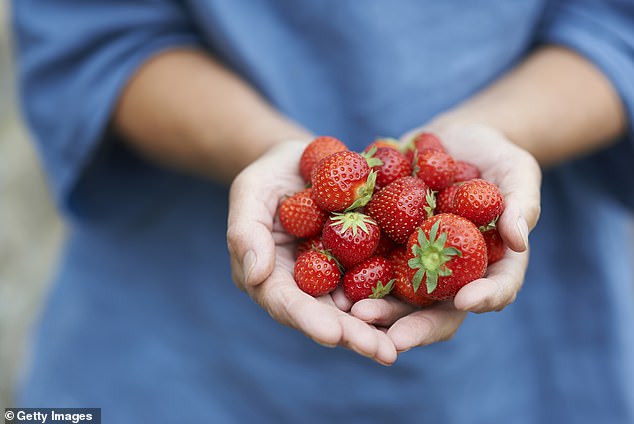
PFAS pesticides present in 95 p.c of strawberries
PFAS, or per- and polyfluoroalkyl substances, are linked to well being issues together with most cancers, excessive ldl cholesterol, diminished kidney operate, thyroid illness, diminished fertility, suppressed immune techniques, and low start weight in infants. That is troubling information – particularly as a result of the opposite ‘soiled’ 11 embody favorites like grapes (PFAS had been present in 61% of samples), cherries (56%) spinach (42%), tomatoes (38%), peaches and nectarines (38%), cucumbers (22%), apricots (20%), beans (15%), spices (8%), cabbage (7%), and lettuce (7%).
Solely apples and potatoes had been comparatively freed from PFAS – solely 2% contained them. The ‘soiled dozen’ is a mixture of PFAS pesticides and fungicides, and consists of lambda-cyhalothrin (a extremely poisonous insecticide to people and bees), which is present in apricots, beans, cabbage, cherries, grapes, lettuce, peaches/nectarines, spinach, strawberries and tomatoes.
A part of a bunch of about 15,000 artificial chemical compounds, PFAS are utilized in client merchandise globally, and plenty of have leaked into our soil and consuming water over time. So even good habits of washing vegetables and fruit received't wash them away. And gentle, juicy fruits with the next water content material usually tend to include PFAS pesticides.
So what to do with this info? Stick with a eating regimen of bacon and crisps? Apparently not. 'Don't panic,' says Gabriella Peacock, a dietary therapist who has labored with shoppers akin to Prince Harry, Princess Beatrice and Joan Collins.
If we help our immune system and liver in its detoxing operate by consuming a wholesome balanced eating regimen – together with quite a lot of fruit and greens – we optimise our physique’s ‘superb potential’ to cope with small quantities of chemical compounds from the setting.
Nutraceutical professional Peacock says that whereas the findings on PFAS are legitimate – 'it’s turning into clear that extreme use of pesticides can typically have dangerous results on the human physique' – it’s not advisable to utterly exclude meals wealthy in these polyphenols and fibre. If we’re involved, we are able to select greens and fruit low in pesticides 'to make sure we get all of the nutritional vitamins and minerals we want'.
Under, Peacock suggests methods to scale back the potential dangers related to pesticide residues, and recommends simple alternate options to merchandise containing PFAS. Nevertheless, she stresses that 'the advantages of those meals outweigh the potential dangers, particularly if they’re from clear and natural sources, so that you don't have to get rid of them out of your eating regimen utterly.'
Gabriella's seven high ideas
extra frozen than contemporary
It’s surprising that 95% of strawberries in UK supermarkets include perpetually chemical compounds. But strawberries – like different berries not examined on this analysis – are very excessive in polyphenols that promote well being and longevity. As I counsel my shoppers, purchase natural if potential, and purchase frozen berries. Frozen fruit just isn’t solely very useful – immediately picked, the antioxidants stay intact, it doesn’t want preservatives to increase its life – additionally it is less expensive than contemporary.
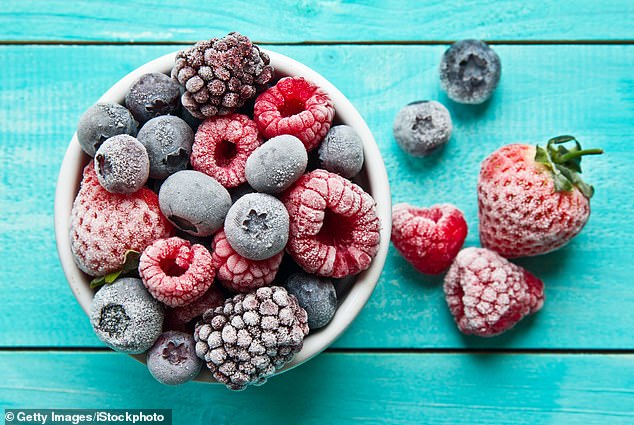
Frozen fruits don’t want preservatives to increase their life
Attempt Tinned
PFAS had been present in 38 p.c of the tomatoes examined, so what are our choices? Use pink bell peppers, that are wealthy in vitamin C and lycopene, which is nice for coronary heart well being. However typically, simply tomatoes can do. So if you happen to're making sauce, use natural canned tomatoes (with extra lycopene than contemporary tomatoes), that are cheap and comparatively low in pesticides. Or use double concentrated natural tomato paste, which is cheap, scrumptious, candy, and wealthy in lycopene. Once more, if it's natural, it's low in PFAS.
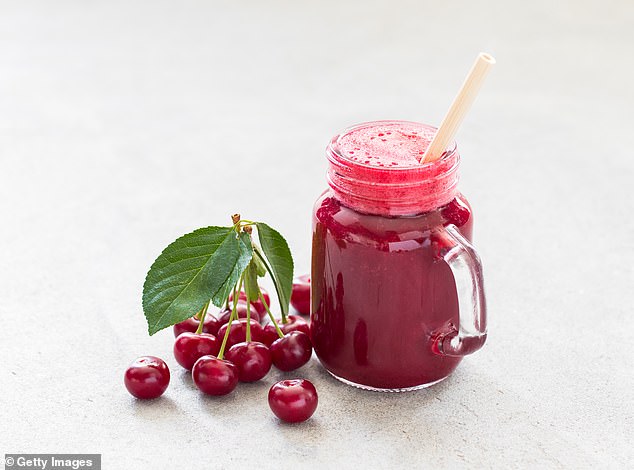
Cherry juice could assist cut back irritation and enhance sleep high quality
Juice Enhance
Cherries are good for us, even if PFAS had been present in 56% of the samples included within the analysis. Nevertheless, you could possibly strive consuming tart cherry juice as a substitute, because it reduces irritation and improves sleep high quality. If the juice is natural, it can include fewer chemical compounds, in addition to a number of useful flavonoids. However if you happen to want, substitute cherries with cranberries, that are recognized for his or her urinary tract well being advantages and antioxidants. (Reassuringly, not way back, fruit juice firm Ocean Spray rejected cranberries grown in a PFAS-contaminated space. Three years of testing by the US Meals and Drug Administration discovered that just about not one of the cranberry samples it examined had detectable ranges of PFAS.)
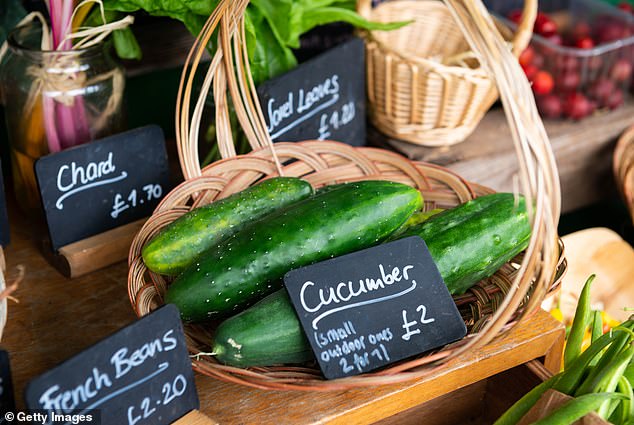
Go to your native farmers market and attempt to study the place your produce comes from, says Gabriella Peacock.
Keep away from the grocery store
Cucumbers, apricots, beans, spices, cabbage, lettuce, potatoes and apples have very low ranges of PFAS, however if you happen to're nonetheless involved, purchase natural produce if potential, as they have an inclination to include fewer chemical compounds total. Think about produce grown within the U.Ok. as a substitute of imported fruit and greens, as some international locations could have looser pesticide restrictions than the U.Ok. Additionally, imported fruit and greens require an additional stage of preservation for the journey. As I inform my shoppers, be interested in the place your produce comes from. Don't at all times purchase from the grocery store. Attempt your native farmers' market, for instance. Eat native, and really feel good!
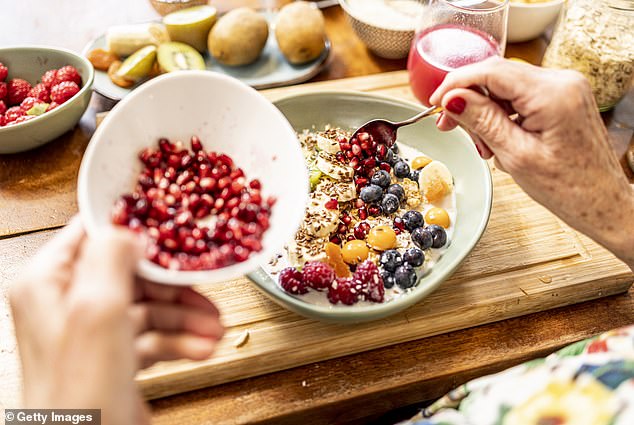
Pomegranates are wealthy in antioxidants and will be eaten together with different fruits for breakfast.
Diversify your vitamin consumption
For those who don't like the concept of 61% of grapes containing PFAS, there are some tasty alternate options. Add antioxidant-rich pomegranates, digestion-friendly kiwi or vitamin C-rich oranges to your eating regimen. Folks love grapes, however they’re excessive in sugar and have little dietary worth. Go natural if potential. Together with quite a lot of meals in your eating regimen and shopping for natural will help cut back potential dangers related to pesticide residues. Because the Pesticide Motion Community UK notes, solely 28 of the 490 substances accepted to be used as pesticides within the EU are accepted to be used in natural farming. Consuming this manner will help make sure you get a wider vary of nutritional vitamins, minerals and health-promoting compounds.
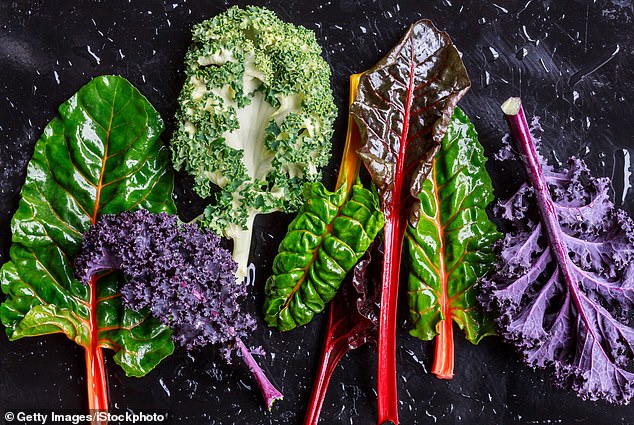
Purple kale and Swiss chard are wealthy in nutritional vitamins A, C, and Ok
Don’t use merchandise packed in plastic
PFAS had been present in 42 p.c of spinach samples, so substitute spinach with a mixture of different leafy greens like kale, Swiss chard and collard greens, that are wealthy in nutritional vitamins A, C and Ok, and minerals like calcium and magnesium (whereas it's potential they’ve related PFAS ranges, an individual eats fewer leaves per serving) and don't overlook cruciferous greens like broccoli and Brussels sprouts, that are antioxidant-rich and anti inflammatory. Some leafy greens could have increased ranges of PFAS as a result of — as a examine within the Journal of Meals Chemistry final yr defined — crops accumulate PFAS from the setting, absorbed via their roots or leaves, or from publicity of their edible elements to pesticides throughout cultivation. Purchase minimally packaged, uncut greens if potential – the examine additionally discovered that 'washing, slicing, packaging' can enhance contamination, and 'ready merchandise include increased ranges of PFAS than contemporary and frozen greens'.
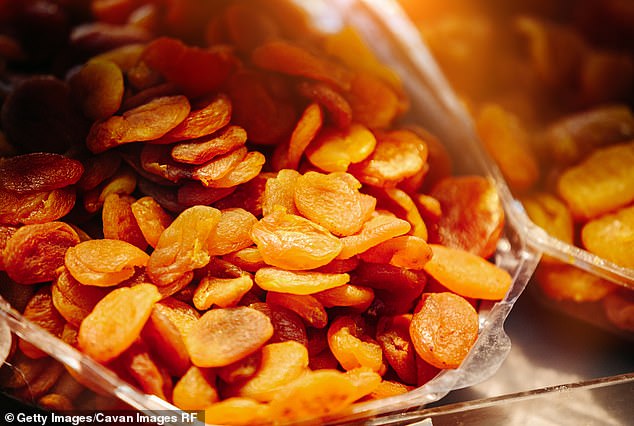
Dried apricots are wealthy in nutritional vitamins A and C
Superfoods for the pores and skin
The evaluation discovered that 38% of peaches and nectarines contained PFAS. For alternate options, strive natural dried apricots or antioxidant-rich plums, wealthy in nutritional vitamins A and C. Or strive mango, which presents related well being advantages and promotes pores and skin well being. The plain benefit is that you just don't eat the pores and skin of this fruit, so that you received't be ingesting any topical chemical compounds. By the way, an Australian authorities trial in 2017 – though with solely two samples – discovered mango to be under the 'set off level' for PFAS in fruit.
- Gabriella Peacock is the bestselling writer of two Weeks to a Youthful You: Secrets and techniques to Residing Longer and Feeling Incredible.gpnutrition.com,


